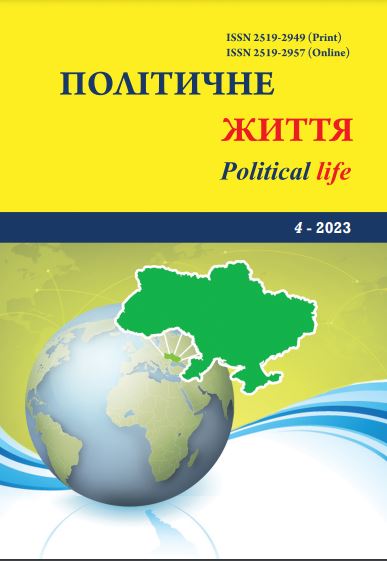Participation of women in external and domestic political processes
DOI:
https://doi.org/10.31558/2519-2949.2023.4.11Keywords:
democracy; representation; political participation; political processes; state; equality of citizens; political regimeAbstract
The article highlights the historical formation of the political status of women. The conditions for inclusion in the political process are characterized. The issue of discrimination against women in politics is highlighted. The methodological principles of the study of the women’s issue in politics, taking into account the national specificity, are provided. The mechanisms of strengthening the political role of women are analyzed. The article attempts to explain the growth of gender norms and feminist strategies in domestic and foreign policy. In order to address these main research questions and stimulate cross-national comparative research, this article proposes a theoretical framework for gendered foreign policy. It is based on two lines of research: international feminist theory and foreign policy analysis. Researchers single out three ways by which a comparative analysis of gender in domestic and foreign policy can be carried out: by distinguishing variations of pro-gender norms and analytical assessment of international trends; by explaining the rise of, as well as countering, gender norms in foreign policy; by examining the sequence of changes in gender norms to reveal contradictions in foreign policy. It is substantiated that the study of aspects of gender issues is of interest to modern political science, as they reflect the attitudes of a social group. Arguments regarding the expediency of building a gender-neutral political space, methods of feminization of the political body and models of parity policy formation. It was determined that the influence of the gender factor on the political behavior of individuals is carried out. Empirical data of political science show that social modifications, cultural transformations, changes in the political sphere determine the impact on political orientation and electoral behavior. However, the latent characteristics of political institutions associated with the use of non-administrative and manipulative resources ensure the reproduction of political relations, male corporatism and elitism in politics.
References
UN Women. 2015. Preventing Conflict, Transforming Justice, Securing the Peace: A Global Study
on the Implementation of UNSCR 1325. New York: UN Women.
Kenski Kate, Jamieson Kathleen Hall. 2000. The Gender Gap in Political Knowledge: Are Women Less Knowledgeable Than Men About Politics? In Everything You Think You Know About Politics And Why You’re Wrong, edited by Hall Jamieson Kathleen. New York: Basic Books.
Davies Sara E., True Jacqui, eds. 2019. The Oxford Handbook on Women, Peace and Security. New York: Oxford University Press.
True Jacqui, Mintrom Michael. 2001. Transnational Networks and Policy Diffusion.International Studies Quarterly 45 (1): р.27–57.
Verba, Sidney, Burns, Nancy, and Schlozman, Kay Lehman. 1997. Knowing and Caring about Politics: Gender and Political Engagement. Journal of Politics 59( 4): 1051– 72.
Grönlund, Kimmo, and Milner, Henry. 2006. The Determinants of Political Knowledge in Comparative Perspective. Scandinavian Political Studies 29 ( 4): 386– 406.
Lovenduski, Joni. 2005. Feminizing Politics. Cambridge: Polity Press.
The official portal of the Verkhovna Rada of Ukraine. URL: http :// iportal . council _ gov . ua / print /8004. html.

